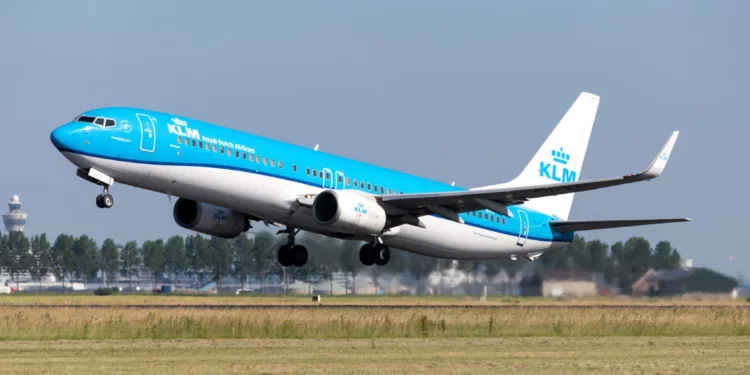The Royal Dutch airline, KLM is transforming the aviation industry by pioneering a sustainable approach of leveraging artificial intelligence (AI) to drastically cut down on food waste on board its flights.
Through the utilization of cutting-edge AI technology, KLM has significantly enhanced its ability to forecast passenger numbers with a high degree of accuracy.
KLM’s new AI model, TRAYS is created for catering and forecasting passenger numbers based on historical data.
This advanced forecasting mechanism ensures that food preparation within the airline is meticulously aligned with real-time demand, thereby optimizing operational efficiency and resource utilization.
As a result of this innovative strategy, KLM has achieved a remarkable reduction of up to sixty-three per cent (63%) in food wastage compared to previous methodologies.
The airline discovered that between three per cent (3%) and five per cent (5%) of passengers do not show up for their flights and this leads to a wastage of over hundred thousand kilograms (100,000kg) annually.
This new technology marks a significant step forward in the airline’s sustainability efforts and commitment to reducing the environmental impact of food wastage.
KLM’s achievement in significantly reducing food waste can be attributed to its implementation of a cutting-edge system developed in partnership with Kickstart AI.
Kickstart AI is an initiative focused on accelerating the integration of artificial intelligence across various sectors in the Netherlands. The TRAYS model, customized specifically for KLM’s catering operations, leverages historical data to forecast passenger volumes for every flight.
The predictive analysis commences approximately seventeen days before the scheduled departure time and undergoes continuous refinement until just 20 minutes before takeoff.
This meticulous approach ensures accuracy in meal planning across various travel classes, optimizing resource allocation and minimizing excess food production that would otherwise contribute to waste.
Sander Stomph, CEO and co-founder of Kickstart AI, highlighted the project’s impact and the goal of accelerating AI adoption within the Dutch business community.
Stomph said,
“Our collaboration with KLM on the TRAYS model showcases the potential of artificial intelligence to address critical business challenges while advancing sustainability goals.”
Also Read: Cricket Gets Transformed With AI In South Africa
What Does This Mean For KLM and Other Commercial Airlines?
Emphasizing KLM’s effort to utilise and integrate digital technology for enhancing flight operations and sustainability, the CEO of the airline, Marjan Rintel said,
“The application of artificial intelligence is a significant step forward in our efforts to make our operations more sustainable. By significantly reducing the number of meals wasted, we are not only cutting costs but also making a positive environmental impact.”
This development puts KLM ahead of other commercial airlines and also allows them the opportunity to save more while minimizing wastage. The amount wasted on food can be used on other important aspects of the business.
If other airlines can adopt and integrate this digital technology into their operations, wastage can be minimized and the environment can be preserved.
In implementing digital technology for operation, KLM intends to go beyond catering. The Dutch airline intends to delve into multiple areas of its operations such as aircraft maintenance and enhancing customer service.
It’s actively developing AI-driven tools designed to predict and mitigate adverse weather conditions, thereby optimizing flight schedules for enhanced reliability.
Additionally, AI algorithms are being harnessed to provide personalized travel recommendations and tips to passengers after they have made their bookings, ensuring a more tailored and seamless travel experience.
This development will transform the aviation industry towards sustainability, demonstrating the potential of AI to transform efficiency in operation and environmental stewardship.
This will also drive other commercial airlines to employ these tools to stay ahead and compete with KLM as the industry seeks alternative ways to reduce environmental impacts.










